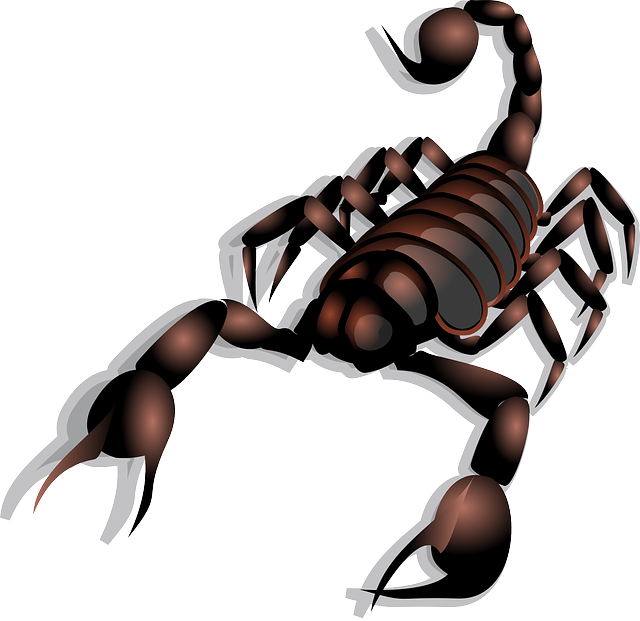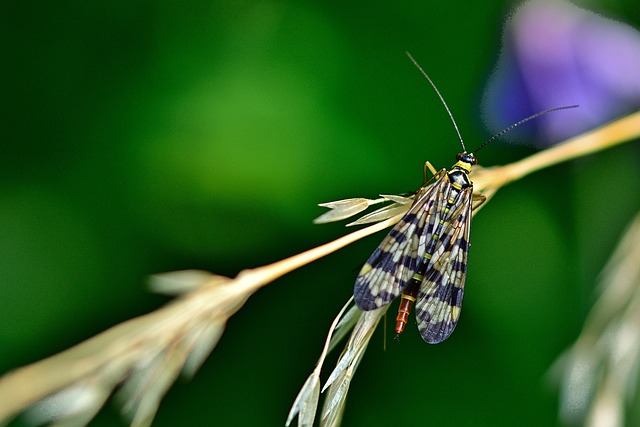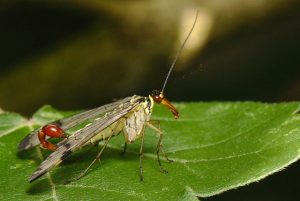Scorpions in Tucson exhibit a strong seasonal pattern with peak activity during the hot summer months, necessitating year-round scorpion control Tucson measures. The Arizona bark scorpion, prevalent in the area, becomes nocturnal to avoid daytime heat, leading to an increased need for homeowners to manage these pests. Effective population management involves understanding their behavior and implementing timed interventions, such as sealing entry points and applying precision pesticides during active periods. While scorpion activity diminishes in fall and winter, they can still be encountered on warm days. Proactive scorpion control Tucson strategies include routine home inspections, maintaining dry environments, and clearing potential hiding spots. Professional services offer targeted solutions using insect growth regulators, baits, and monitoring systems to manage scorpion populations safely. By understanding environmental triggers and staying vigilant, Tucson residents can minimize scorpion presence, enhancing safety and comfort in their homes. Engaging with local pest management experts is key for effective, year-round scorpion control Tucson.
Exploring the intricate seasonal activity patterns of Tucson’s native scorpions sheds light on their resilience and behavior, crucial for effective scorpion control in the region. This article delves into the environmental factors influencing these arachnids, offering insights into their peak activity periods and the best strategies for safeguarding your space. Understanding the role of climate and habitat is key to implementing proactive measures, ensuring Tucson residents can manage and mitigate encounters with scorpions, enhancing safety and comfort in homes throughout the year.
- Decoding the Rhythms: Seasonal Activity Patterns of Tucson Scorpions
- The Role of Environment and Climate in Scorpion Behavior
- Effective Strategies for Tucson Scorpion Control During Peak Activity Periods
- Safeguarding Your Space: Preventative Measures and Proactive Scorpion Management in Tucson Homes
Decoding the Rhythms: Seasonal Activity Patterns of Tucson Scorpions

Scorpions in Tucson exhibit distinct seasonal activity patterns that are influenced by the arid climate and environmental conditions. As the mercury rises, scorpion activity peaks during the summer months, with the species most commonly found in Tucson, such as the Arizona bark scorpion, becoming more active at night to avoid the intense heat of the day. Homeowners in Tucson often seek scorpion control solutions during this time due to the increased likelihood of encounters within residences. The higher humidity levels and warmer temperatures provide an optimal environment for these arachnids to thrive, leading to a surge in their reproductive cycles and foraging behaviors. To effectively manage scorpion populations, understanding these seasonal rhythms is crucial for implementing targeted control measures, such as sealing entry points and employing strategic pesticide applications that align with the scorpions’ active periods.
During the cooler months, particularly in the fall and winter, scorpion activity subsides as they enter a more dormant state to conserve energy. However, it’s not uncommon for scorpions to be found on warm days during these seasons, especially in structures that offer protection from cold temperatures and predators. Scorpion control Tucson remains an important consideration year-round, as scorpions can still be a nuisance and a potential hazard even when their activity diminishes. Maintaining a proactive approach to scorpion control, including regular inspections of the home’s perimeter and proper sealing of any cracks or crevices, is essential for managing these creatures throughout the year and minimizing the risk of infestations in Tucson homes.
The Role of Environment and Climate in Scorpion Behavior

Scorpions in Tucson, Arizona, exhibit distinct seasonal activity patterns that are closely tied to environmental and climatic factors. These arachnids thrive in warm, dry conditions, which are abundant in this region. The Sonoran Desert’s unique ecosystem, characterized by its extreme temperatures and low humidity, influences the scorpions’ behavior significantly. During the hot summer months, scorpions seek shelter in cooler microhabitats such as under rocks, logs, or within human dwellings—a phenomenon that often necessitates scorpion control measures in Tucson homes. The scorching heat drives them to these refuges during the day, where they remain active at night, foraging for food and water. As temperatures drop in autumn, scorpions become more active, with males particularly on the move in search of mates. This seasonal shift in behavior underscores the importance of understanding environmental cues to implement effective scorpion control Tucson strategies.
The monsoon season, from mid-July to September, brings a surge in scorpion activity due to increased moisture and humidity. This period also sees an increase in their reproductive activities, as the wetter conditions provide optimal conditions for the survival of their offspring. Conversely, during the winter months, scorpions are less active, often retreating into even deeper hiding places to avoid the cold. The interplay between temperature and humidity levels dictates when scorpions will emerge, hunt for prey, or conserve energy. Homeowners in Tucson must be vigilant throughout the year, employing scorpion control measures tailored to these seasonal variations to mitigate the risks associated with scorpion infestations. Understanding the environmental factors that drive scorpion behavior is thus critical for effective pest management and ensuring a safe living environment in Tucson.
Effective Strategies for Tucson Scorpion Control During Peak Activity Periods

To effectively manage the seasonal activity of Tucson scorpions, it’s crucial to understand their behavior patterns and peak activity periods. Scorpion control in Tucson requires a multi-faceted approach that combines environmental management with targeted pest control strategies. During the warmer months, particularly from May to October, scorpions become more active as they seek out moisture and prey. Homeowners can minimize their exposure by maintaining clean and dry living spaces, sealing entry points, and removing hideouts such as rocks, woodpiles, or debris near the structure. Employing dehumidifiers in damp areas and keeping foliage trimmed can also deter scorpions.
Professional scorpion control services in Tucson often utilize a combination of insect growth regulators, non-toxic baits, and monitoring devices to track scorpion activity. These methods are designed to reduce the population over time without posing significant risks to humans or pets. Additionally, regular inspections of one’s property, especially during peak activity seasons, can help identify and seal potential entry points. By understanding the environmental conditions that trigger increased scorpion activity and implementing proactive measures, residents of Tucson can significantly reduce the presence of these arachnids in and around their homes, thereby ensuring a safer environment for themselves and their families. Regular maintenance and vigilance are key components of an effective scorpion control strategy in Tucson’s unique climate.
Safeguarding Your Space: Preventative Measures and Proactive Scorpion Management in Tucson Homes

In Tucson, Arizona, scorpion control is a year-round concern due to the region’s arid climate and diverse scorpion species. Homeowners in Tucson can safeguard their spaces by implementing preventative measures tailored to the local fauna, particularly scorpions like the Arizona bark scorpion, which is known for its ability to climb. Effective scorpion control Tucson begins with sealing entry points, as these creatures are adept at finding even the smallest cracks and crevices to enter. It’s crucial to regularly inspect the perimeter of your home, ensuring that all windows, doors, and vents are properly sealed. Additionally, keeping outdoor lighting at a minimum can prevent attracting insects, which scorpions feed on. Employing landscape lighting that casts broader, less focused light can further discourage scorpions from making their way into your living spaces.
Beyond sealing and lighting, maintaining a well-lit and clutter-free environment inside your home is also a key component of scorpion control Tucson. Scorpions are less likely to venture into areas where they can be easily seen. Regularly inspecting and decluttering areas like garages, storage rooms, and bathrooms can reduce the likelihood of scorpions finding a suitable habitat within your home. Using appropriate scorpion control solutions, such as insecticide dusts in hidden corners, can also deter these arachnids. For a comprehensive approach to scorpion control Tucson, it’s advisable to consult with local pest management professionals who are well-versed in the behavior and habits of Tucson scorpions. They can provide personalized solutions that ensure your home remains a safe environment for you and your family throughout the year.
Tucson’s arid climate plays a pivotal role in shaping the seasonal activity patterns of its indigenous scorpions. By delving into the environmental factors that influence their behavior, residents can better understand and manage these creatures. This article has elucidated the intricate rhythms of Tucson scorpions and offered tailored strategies for scorpion control in Tucson, ensuring a safer environment within homes. Implementing preventative measures and staying informed on proactive management techniques are key to coexisting with these arachnids. With this knowledge, Tucson residents can take confident steps in safeguarding their spaces against the peak activity of scorpions, enhancing both comfort and safety throughout the year.
